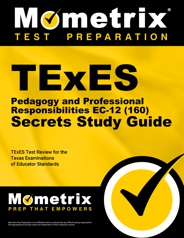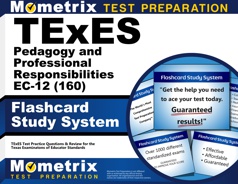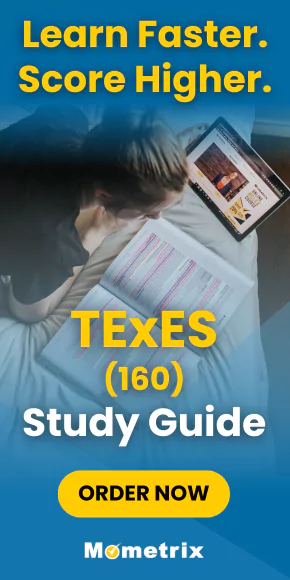The Texas Examinations of Educator Standards (TExES) Pedagogy and Responsibilities EC-12 is an exam used to assess your requisite skills and knowledge as an entry-level teacher in Texas public schools.
Click “Start Test” above to take a free TExES Pedagogy and Professional Responsibilities practice test!
Exam Outline
The TExES Pedagogy and Professional Responsibilities EC-12 (160) exam is a computer-adaptive exam that contains 100 multiple-choice questions, and you will be given a time limit of 4 hours and 45 minutes.
The exam is split into four content domains, and each domain is split into some number of competencies one is expected to be familiar with.
I. Designing Instruction and Assessment to Promote Student Learning (34%)
The questions in this domain are split into four competencies:
Understanding various human developmental processes, as well as planning instruction that motivates students and is responsive to their developmental needs
Competency 2
Understanding diversity in a group of students, as well as knowing how to plan and design assessments that are responsive to a wide range of students and their differences
Competency 3
Understanding the procedures for designing effective and coherent instruction and assessments based on appropriate learning goals
Competency 4
Understanding the factors that impact student learning, as well as planning effective, engaging, and appropriate instruction
II. Creating a Positive, Productive Classroom Environment (13%)
The questions in this domain are split into two competencies:
Knowing how to create a classroom climate that encourages learning, excellence, and equity and is safe and productive
Competency 2
Understanding strategies for creating an organized and productive learning environment
III. Implementing Effective, Responsive Instruction and Assessment (33%)
The questions in this domain are split into four competencies:
Understanding and applying effective communication in various learning contexts
Competency 2
Providing appropriate instruction that engages students in the learning process
Competency 3
Incorporating technology effectively as a way to organize and deliver instruction
Competency 4
Monitoring student performance and achievement, providing students with prompt feedback, and responding with flexibility to promote learning
IV. Fulfilling Professional Roles and Responsibilities (20%)
The questions in this domain are split into three competencies:
Understanding the importance of family being involved in a child’s education and knowing how to communicate and interact with families effectively
Competency 2
Enhancing professional knowledge and skills by interacting with other educational community members effectively and participating in a variety of professional activities
Competency 3
Understanding and adhering to legal and ethical requirements for educators
Check Out Mometrix's TExES Study Guide
Get practice questions, video tutorials, and detailed study lessons
Get Your Study Guide
Registration
To register for the exam, you must create an online NES account via their website. You can register for the exam and schedule an exam date through this account. When you register, you will need to pay the $116 examination fee.
How to Study for the Exam
Think you aren’t a good test-taker? Maybe on a study-time crunch? Or just don’t know how to begin studying? Mometrix has designed a new Study Secrets course to help every student, no matter what study scenario you are in. Here’s what you’ll find in the Study Secrets Course:
- Techniques to Conquer Procrastination
- Steps to building a Study Plan custom to your learning style
- 7 Effective Note-Taking Methods
- Test-Taking Tips
- Memory Techniques and Mnemonics
- And much more!
Everyone learns differently, so we’ve tailored our Study Secrets Course to ensure every learner has what they need to prepare for their upcoming exam or semester. Click below to check it out!
Test Day
You should arrive at the testing center 15-30 minutes prior to the scheduled exam time in order to leave enough time for the check-in process. Once you arrive, you will be asked to present one form of valid photo ID. If you forget to bring your ID or your ID is invalid, you will not be permitted to take the exam.
After the check-in process, you will be asked to leave all personal items in a locker outside the testing area. This includes your phone, any electronic communication device, bag/purse, hat, food, and any smoking/vaping devices. If you wear eyeglasses, they will be inspected by a testing center agent before you enter the testing room.
Once you enter the testing room, you will be asked to sign an NDA, and you will be given a brief tutorial on the computer-adaptive testing system. Once the tutorial is complete, the exam will begin.
You are allowed to take a restroom break during the exam, but the timer will not be paused while you are away.
How the Exam is Scored
The Pedagogy and Professional Responsibilities EC–12 (160) exam is computer-adaptive. Here’s a look at how it works:
The first question is judged to be of medium difficulty, and depending on your performance, the next question may be easier or harder. If you do well in the first question, the second question will be harder; conversely, if you do poorly on the first question, the second question will be easy.
The questions on this exam are rated on a scale of 100-300. The higher a question is rated, the harder the question is (e.g., a question marked as 210 will be more difficult than a question marked 140).
To pass the exam, your final question must be on or above the 240 mark. If your final question is below this mark, you will not pass the exam, even if you have answered some questions above the 240 mark at some point during the exam. This is because the computer has rated the difficulty of your final question based on how you answered the previous questions.
Check Out Mometrix's TExES Flashcards
Get complex subjects broken down into easily understandable concepts
Get Your Flashcards
How to Prepare for the Exam
How to Study Effectively
Your success on TExES test day depends not only on how many hours you put into preparing but also on whether you prepared the right way. It’s good to check along the way to see whether your studying is paying off. One of the most effective ways to do this is by taking TExES practice tests to evaluate your progress. Practice tests are useful because they show exactly where you need to improve. Every time you take a free Pedagogy and Professional Responsibilities EC–12 exam practice test, pay special attention to these three groups of questions:
- The questions you got wrong
- The ones you had to guess on, even if you guessed right
- The ones you found difficult or slow to work through
This will show you exactly what your weak areas are and where you need to devote more study time. Ask yourself why each of these questions gave you trouble. Was it because you didn’t understand the material? Was it because you didn’t remember the vocabulary? Do you need more repetitions on this type of question to build speed and confidence? Dig into those questions and figure out how you can strengthen your weak areas as you go back to review the material.
Answer Explanations
Additionally, many TExES (160) practice tests have a section explaining the answer choices. It can be tempting to read the explanation and think that you now have a good understanding of the concept. However, an explanation likely only covers part of the question’s broader context. Even if the explanation makes sense, go back and investigate every concept related to the question until you’re positive you have a thorough understanding.
Comprehend Each Topic
As you go along, keep in mind that the TExES practice test is just that: practice. Memorizing these questions and answers will not be very helpful on the actual test because it is unlikely to have any of the same exact questions. If you only know the right answers to the sample questions, you won’t be prepared for the real thing. Study the concepts until you understand them fully, and then you’ll be able to answer any question that shows up on the test.
Strategy for TExES Practice
When you’re ready to start taking practice tests, follow this strategy:
- Remove Limitations. Take the first test with no time constraints and with your notes and TExES Pedagogy and Professional Responsibilities study guide handy. Take your time and focus on applying the strategies you’ve learned.
- Time Yourself. Take the second practice test “open book” as well, but set a timer and practice pacing yourself to finish in time.
- Simulate Test Day. Take any other practice tests as if it were test day. Set a timer and put away your study materials. Sit at a table or desk in a quiet room, imagine yourself at the testing center, and answer questions as quickly and accurately as possible.
- Keep Practicing. Keep taking practice tests on a regular basis until you run out of practice tests or it’s time for the actual test. Your mind will be ready for the schedule and stress of test day, and you’ll be able to focus on recalling the material you’ve learned.
FAQs
Q
How many questions are on the TExES (160) exam?
A
There are 100 multiple-choice questions on the exam.
Q
How long is the TExES (160) exam?
A
The time limit for this exam is 4 hours and 45 minutes.
Q
What is the passing score for the TExES (160) exam?
A
To pass the exam, you must achieve a scaled score of at least 240.
Q
How much does the TExES (160) exam cost?
A
The examination fee is $116.



